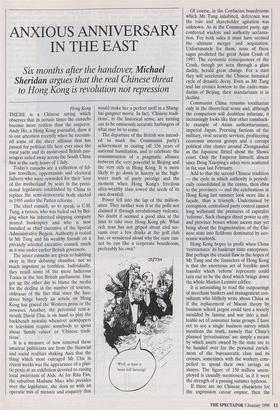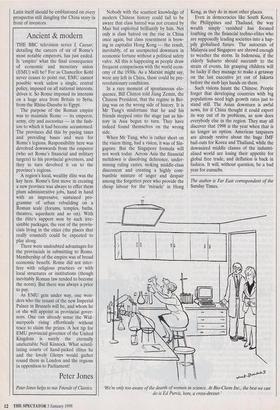ANXIOUS ANNIVERSARY IN THE EAST
Six months after the handover, Michael Sheridan argues that the real Chinese threat
to Hong Kong is revolution not repression
Hong Kong THERE is a Chinese saying which observes that in certain times the eunuchs become more restless than the emperor. Andy Ho, a Hong Kong journalist, drew it to our attention recently when he recount- ed some of the sheer silliness that has passed for political life here ever since the royal yacht and its moist-eyed British pas- sengers sailed away across the South China Sea in the early hours of 1 July. Today's eunuchs are a collection of fel- low travellers, opportunists and electoral failures who were rewarded for their 'love of the motherland' by seats in the provi- sional legislature established by China to replace the semi-democratic body elected in 1995 under the Patten reforms.
The chief eunuch, so to speak, is C.H. Tung, a tycoon, who was bailed out by Bei- jing when his inherited shipping company neared bankruptcy and who is now installed as chief executive of the Special Administrative Region. Authority is vested in Mr Tung and his wealthy friends on a privately selected executive council, much as it was under earlier British governors.
The lesser eunuchs are given to babbling away in their debating chamber, not so much impotent as toothless. Individually, they recall some of the more ludicrous Tories in the last British parliament. One got up the other day to blame the media for the decline in the number of tourists, oblivious of the fact that since the han- dover binge barely an article on Hong Kong has graced the Western press or the airwaves. Another, the perennial rent-a- mouth David Chu, is on hand to play the backbench moralist whenever newspapers or television require somebody to spout about 'family values' or 'Chinese tradi- tions'.
It is a measure of how removed these amateur politicians are from the financial and social realities shaking Asia that the thing which most outraged Mr Chu in recent weeks was the appearance of a plas- tic penis at an exhibition devoted to raising local awareness of Aids. As for Rita Fan, the suburban Madame Mao, who presides over the legislature, she does so with an operatic mix of menace and coquetry that would make her a perfect moll in a Shang- hai gangster movie. In fact, 'Chinese tradi- tions', in the historical sense, are turning out to be ominously accurate harbingers of what may be to come.
The departure of the British was intend- ed to mark the Communist party's achievement in casting off 156 years of national humiliation, and to celebrate the consummation of a pragmatic alliance between the very powerful in Beijing and the very rich in Hong Kong. It is more likely to go down in history as the high- water mark of party prestige and the moment when Hong Kong's frivolous ultra-wealthy class sowed the seeds of its own downfall.
Power fell into the lap of the million- aires. They neither won it at the polls nor claimed it through revolutionary violence. No doubt it seemed a good idea at the time to take over Hong Kong plc. What rich man has not griped about civil ser- vants over a few drinks at the golf club bar, or wondered aloud why the state can- not be run like a corporate boardroom, preferably his own? Of course, in the Confucian boardrooms which Mr Tung inhabited, deference was the 'rule and shareholder agitation was unknown. As in the Communist party, age conferred wisdom and authority acclama- tion. For both sides it must have seemed the ultimate merger and acquisition. Unfortunately for them, none of these sages predicted the great Asian Crash of 1997. The economic consequences of the Crash, though yet seen through a glass darkly, herald great change. For a start they will accelerate the Chinese historical cycle of dynastic decay. Even as Mr Tung and his cronies kowtow to the cadre-man- darins of Beijing, their mandarinate is in decline.
Communist China remains totalitarian only in the theoretical sense and, although the comparison will doubtless infuriate, it increasingly looks like that other ramshack- le example of Asian authoritarianism, imperial Japan. Preening factions of the military, rival security services, profiteering economic interest groups and a corrupt political elite cluster around Zhongnanhai as the Japanese flitted about the Showa court. Only the Emperor himself, absent since Deng Xiaoping's ashes were scattered in the seas last February.
Add to that the second Chinese tradition — the cycle in which authority is periodi- cally consolidated in the centre, then ebbs to the provinces — and the celebrations in Hong Kong last summer look more like a façade, than a triumph. Undermined by corruption, centralised party control cannot long withstand the pressures of capitalist `reforms'. Such changes direct power to city and province bosses whose ascent may yet bring about the fragmentation of the Chi- nese state into fiefdoms dominated by eco- nomic warlords.
Hong Kong hopes to profit when China `restructures' its bankrupt state enterprises. But perhaps the crucial flaw in the hopes of Mr Tung and the financiers of Hong Kong is that the enormous act of forcible asset transfer which 'reform' represents could turn out to be the deed which brings down the whole Market-Leninist edifice.
It is astonishing to read the outpourings of merchant bankers and management con- sultants who blithely write about China as if the replacement of Maoist theory by business school jargon could turn a society moulded by famine and war into a mal- leable set of consumer focus groups. I have yet to see a single business survey which mentions the truth, namely that China's planned `privatisations' are simply a means by which assets owned by the state are to be handed over for the personal enrich- ment of the bureaucratic class and its cronies, sometimes with the workers com- pelled to spend their own savings on shares. The figure of 150 million unem- ployed is casually mentioned, as if it were the strength of a passing summer typhoon.
If there are no Chinese characters for the expression caveat emptor, then the Latin itself should be emblazoned on every prospectus still dangling the China story in front of investors. Nobody with the scantiest knowledge of modern Chinese history could fail to be aware that class hatred was not created by Mao but exploited brilliantly by him. Not only is class hatred on the rise in China once again, but class resentment is brew- ing in capitalist Hong Kong — the result, inevitably, of an unexpected downturn in economic fortune without a political safety valve. All this is happening as people draw frequent comparisons with the world econ- omy of the 1930s. As a Marxist might say, were any left in China, these could be pre- revolutionary conditions.
In a rare moment of spontaneous elo- quence, Bill Clinton told Jiang Zemin, the Chinese President, that the regime in Bei- jing was on the wrong side of history. It is Mr Tung's misfortune that he and his friends stepped onto the stage just as his- tory in Asia began to turn. They have indeed found themselves on the wrong side.
When Mr Tung, who is rather short on the vision thing, had a vision, it was of Sin- gapore. But the Singapore formula will not work today. Across Asia the financial meltdown is dissolving deference, under- mining ruling castes, stoking middle-class discontent and creating a highly com- bustible mixture of anger and despair among the forgotten poor who provide the cheap labour for the 'miracle' in Hong Kong, as they do in most other places.
Even in democracies like South Korea, the Philippines and Thailand, the way wealth simply vanished has focused loathing on the financial techno-elites who are supposedly leading societies into a hap- pily globalised future. The autocrats of Malaysia and Singapore are shrewd enough to weather the storm. In Indonesia, if the elderly Suharto should succumb to the strain of events, his grasping children will be lucky if they manage to make a getaway on the last executive jet out of Jakarta before the mob lays hands on them.
Such visions haunt the Chinese. People forget that developing countries with big populations need high growth rates just to stand still. The Asian downturn is awful news, for if China thought it could export its way out of its problems, so now does everybody else in the region. They may all discover that 1998 is the year when that is no longer an option. American taxpayers are already restive about the huge IMF bail-outs for Korea and Thailand, while the downsized middle classes of the industri- alised world are losing their appetite for global free trade, and deflation is back in fashion. It will, without question, be a bad year for eunuchs.
The author is Far East correspondent of the Sunday Times.
`We're only too aware of the dearth of women in science. At Bio-Chem Inc., the best we can do is Ed Purvis, here, a cross-dresser.'



















































 Previous page
Previous page